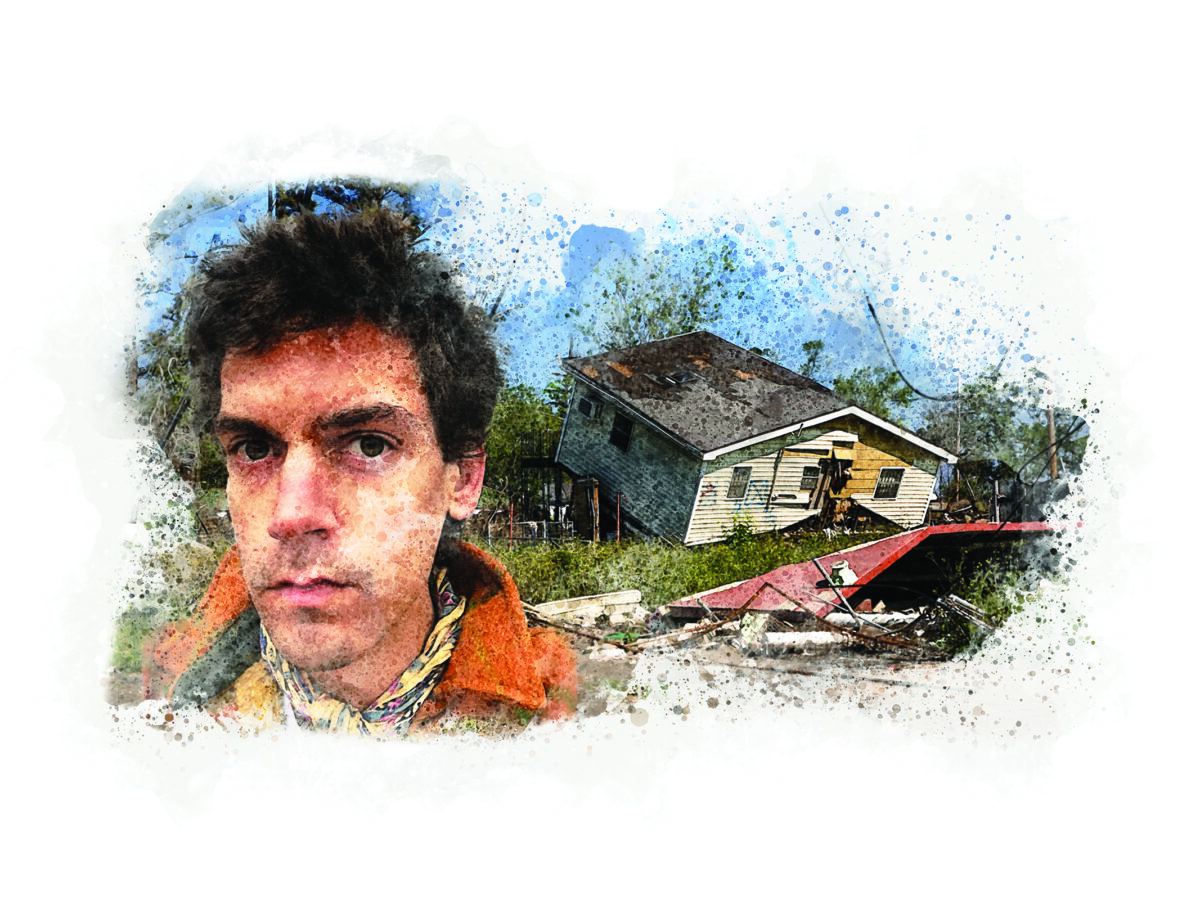David Williams ’07

Life after Hurricane Katrina
I’m back in New England again, but this time, so is the storm. Driving over the Sagamore Bridge I’m bracketed by MassDOT traffic signs: TROPICAL STORM WARNING. On cue, the props director in heaven issues forth a white and solid wall of water, arriving on a sheet of wind that pushes my little Japanese car toward the side of the road. A moment later two black birds avoid my windshield by a foot. Stop here, the birds augur, but I demur, and blindly, stupidly, once again, trust the engineers of the U.S. government. Highways are different from levees, I tell myself. America’s always been better at moving on than holding back. I shift my butt back in the seat, lean my chest toward the wheel and, opening my eyes wide, follow the pavement right on in to Provincetown — which, depending on your mood or the way you turn your face, is either the end of the road, or the start of it.
I’d left Michael Maruca’s house in Somerville that morning, where we’d shared an early breakfast, a bowl of toasted oats his wife had made, over yogurt, with thick coffee. We sat quietly in the cool gray morning and watched the little birds play on the stump of a tree in his unkept yard. Mike and I were never meant to be friends, but the flood mixed things up, and we both found ourselves part of Exeter’s class of 2007. It’s confusing when wonderful things sprout from terrible seeds, but when it comes to Mike, thank God for Katrina. Mike is my lifetime good pal and how could it have been any different?
I pulled into Herring Cove a few hours later. Working the door against the storm I climb out of the car and into the sand, and stare awhile into the white ocean. The wind is Provincetown cold but the drops falling as stinging wet rags from the tropical system are all Louisiana fat and warm, and I feel comforted. These are the last breaths of Jose, which had dawdled, lonely and angry, around the Atlantic for most of September. I see the surf take a bite of the beach and think of the fragile nature of the Cape, the fragile nature of home, and what wisdom there is in the moments things change.
I remember when I first heard about it. Change. It was Friday night in late August 2005, at Amelia’s birthday party.
“You hear about the storm?”
“What storm?”
“Down Florida now. Turned toward us.”
“School Monday?”
“Maybe not.”
By the next afternoon change was on the horizon and moving due north at 9 miles per hour. I ate pizza with my parents under graying skies and slowly falling pressure, a feeling that’s always caused my head to spin and my heart to open. I find it thrilling. The decision was made over Caesar salad and a Coke: Mom and I would leave in the morning. Dad would stay. Someone had to watch the house.
I brought one pair of underwear and my French books. No one really thought we’d be gone more than a couple days. The storm always turned.
We stopped at the first open room in the South, in Selma. The TV screens in the lobby looped a solid red spinning disc of doom, and for the first time, I was frightened of things. Distracting myself in the great American tradition, I ate at midnight, in the little Waffle House on U.S. 80. The sweaty server skittered nervously about the empty place and kept apologizing for forgetting my place setting, forgetting my coffee.
“It’s my first day,” she said. “I’m so sorry.”
“It’s OK,” was all I said, when all I wanted was to cry for her, my father, my city, my self.
A day later, news out of New Orleans was sensational and unverifiable: Every house under 20 feet of water. Gun battles in quiet neighborhoods. Fellow citizens floating.
Dad wasn’t dead after all. He had picked his way to the river — the highest point in the city — with a car and a chainsaw. A week later I found him shaken in a field in South Carolina, and like someone back from the war, he didn’t want to talk about it.
The city closed. Friends were matriculating to Houston, Dallas, Chicago, rural Tennessee. I wanted none of that. Seeking a little romance in the middle of a tragedy, I Googled (was that already a verb, then?) “best boarding schools in America.”